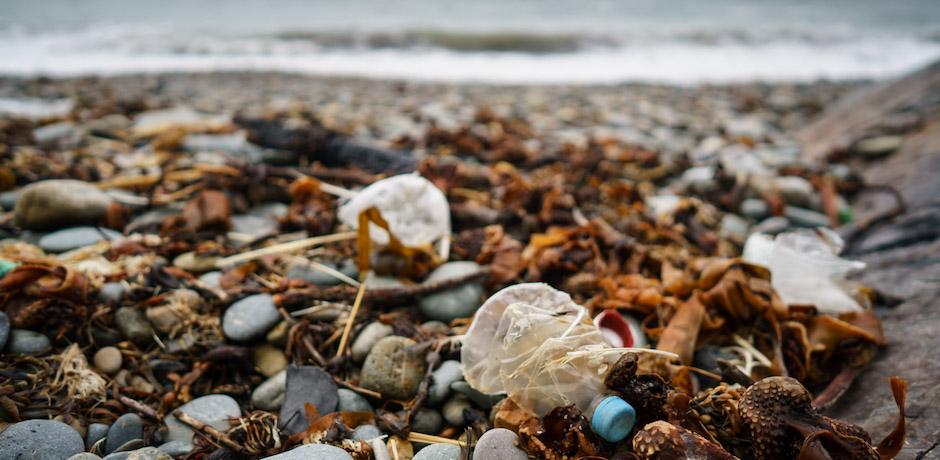Plastics are Changing our DNA...
Director and Adverse Camber Artistic Advisor, Paula Crutchlow writes about how her Cultural Geography research into the urgent global issue of plastic pollution has influenced her work on Dreaming the Night Field.
As part of our research for Dreaming the Night Field we spent creative time in the sites of Tomen-Y-Mur and Llech Ronw, noticing and experiencing these places closely. Re-connecting to the ancient writing of the Fourth Branch of the Mabinogi through the landscapes it is part of, there was a choice to either take stock of possible changes in those landscapes, or ignore them. Standing on the mound of Tomen-Y-Mur you can't escape the view of the de-commissioned nuclear power station. Or avoid the blue plastic sheeting, bailer twine, and corrugated iron farming debris embedded in the sheep bitten turf. Thinking these places and materials through the lens of the Fourth Branch story, brought the effects of industrial, chemical and nuclear processes into resonance as experimental actions of transformation - with culmulative effects. Human manipulations and re-configurations that initiate impossible-to-stop movements of un-natural materials into the bodies of plants, animals and the future geological layers of the earth. Since the beginning of the performance development, the whole team have been involved in conversations around how the themes of transformation in the story might resonate with contemporary audiences. There are actions of mundane and purposeful transformation such as the forging of a spear that is used as an instrument of murder. There are more 'unatural', temporary and permanent transformations of mushrooms into armour and gold, seaweed into shoes, men into pigs, and wolves and deer, animals into babies, and people into birds. One of the central pivots of the action is the making of Blodeuwedd. A woman 'conjured' from flowers by the two magicians to serve as a wife for Lleu, a young man cursed never to have a wife of human form. The creation of Blodeuwedd – as with the other acts of magic - is a way of solving an immediate problem, without any thought it seems for the consequences of the action on those involved, or its continuing repercussions. The world of the Fourth Branch is one where growing, running and flying things are much closer kin to us than we are used to considering them. The names of the characters are also the Welsh names of the star constellations; and the world of plants and animals contrasts with the civilised spaces inside castle walls. We wanted to bring this feeling of relatedness, contrast of the natural and the human made, and aspects of our experiences of the places in North Wales into the performance space. Michael began to explore poetry from the The Black Book of Camarthen in a kind of shamanic, rhythmic pulse. Stacey and Lynne worked on music that integrated experimental with traditional song. Sophia brought in scavenged branches, grown in moorland weather, chopped up and re-connected in unexpected ways. The idea of the plastic flotsam and jetsam arrived as a visible consequence of human experimentation with something that has expanded way beyond our control. Since the first cheap method of production was invented by Leo Baekeland (Bakelite) in 1909, plastic has permeated all aspects of our lives from Tupperware to Sellotape, food packaging to almost every aspect of our clothing. An incredibly versatile and highly valuable resource, its durability has contributed to leaps in medicine and engineering. But through our treatment of plastic as if it were disposable, we have created a wash of consequences that include massive ocean gyres, poisoned wildlife and huge mountains of non-composting waste. The amount of plastic made in the first 10 years of 21stcentury is equal to the amount of plastic made in the whole 20thcentury, and it is being rapidly distributed across the globe through natural and human-made processes of weather, earth and water movement. Plastics are used to make our hair shiny and our jeans stretchy, and the pthalates used to keep plastics flexible, along with the chemicals that leach out of it through photodegradation, mean that toxic chemicals transported make their way into the food chain and into our bodies, changing the fundamental qualities and behaviours of things we once considered natural. In a recent blog post, Georges Monbiot reminds us of the power of words to 'frame the living world' and bring us into emotional relationship with places and things in ways that directly influence our perceptions and actions. The scenographic choices in this performance of the Fourth Branch are not the driving force, nor intended as a direct metaphor. They are a way of fusing the materiality of ancient and contemporary landscapes across time in ways that suggest irrevocably changed worlds; perhaps shifting perceptions and raising questions around the many acts of transformation and their consequences we are part of enacting as part of our daily lives together. Paula Crutchlow www.blindditch.org
